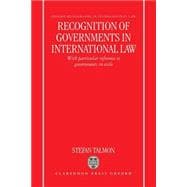
Note: Supplemental materials are not guaranteed with Rental or Used book purchases.
Purchase Benefits
What is included with this book?
| Abbreviations | xv | ||||
|
xxvii | ||||
| Alphabetical Table | xxvii | ||||
| Classification According to Countries and Courts | xxxv | ||||
|
lvii | ||||
| Bilateral Treaties | lvii | ||||
| Multilateral Treaties | lxii | ||||
|
lxvii | ||||
| Introduction | 3 | (1) | |||
|
3 | (11) | |||
|
14 | (7) | |||
| Part I. Meanings of Recognition of Governments in International Law | |||||
|
21 | (23) | |||
|
21 | (2) | |||
|
23 | (6) | |||
|
29 | (4) | |||
|
33 | (11) | |||
|
44 | (71) | |||
|
44 | (5) | |||
|
49 | (10) | |||
|
49 | (5) | |||
|
54 | (2) | |||
|
56 | (3) | |||
|
59 | (56) | |||
|
59 | (6) | |||
|
65 | (12) | |||
|
77 | (12) | |||
|
89 | (6) | |||
|
95 | (1) | |||
|
95 | (7) | |||
|
102 | (3) | |||
|
105 | (2) | |||
|
107 | (1) | |||
|
108 | (7) | |||
| Part II. Legal Status of Authorities in Exile Recognized as Governments | |||||
|
115 | (2) | |||
|
117 | (90) | |||
|
117 | (32) | |||
|
117 | (1) | |||
|
117 | (12) | |||
|
129 | (7) | |||
|
136 | (6) | |||
|
142 | (7) | |||
|
149 | (42) | |||
|
149 | (1) | |||
|
149 | (10) | |||
|
159 | (6) | |||
|
165 | (3) | |||
|
168 | (5) | |||
|
173 | (1) | |||
|
173 | (11) | |||
|
184 | (5) | |||
|
189 | (2) | |||
|
191 | (11) | |||
|
191 | (4) | |||
|
195 | (1) | |||
|
195 | (1) | |||
|
196 | (1) | |||
|
196 | (3) | |||
|
199 | (3) | |||
|
202 | (5) | |||
|
207 | (44) | |||
|
207 | (1) | |||
|
208 | (10) | |||
|
208 | (7) | |||
|
215 | (3) | |||
|
218 | (20) | |||
|
219 | (1) | |||
|
219 | (8) | |||
|
227 | (4) | |||
|
231 | (7) | |||
|
238 | (5) | |||
|
243 | (8) | |||
|
243 | (3) | |||
|
246 | (2) | |||
|
248 | (3) | |||
|
251 | (18) | |||
|
251 | (1) | |||
|
252 | (6) | |||
|
252 | (1) | |||
|
252 | (2) | |||
|
254 | (1) | |||
|
255 | (1) | |||
|
256 | (2) | |||
|
258 | (11) | |||
|
258 | (1) | |||
|
259 | (2) | |||
|
261 | (5) | |||
|
266 | (1) | |||
|
267 | (2) | |||
| Conclusion | 269 | (6) | |||
| Appendices | 275 | (68) | |||
|
275 | (11) | |||
|
286 | (32) | |||
|
318 | (25) | |||
| Bibliography | 343 | (32) | |||
|
343 | (24) | |||
|
367 | (8) | |||
| Index | 375 |
The New copy of this book will include any supplemental materials advertised. Please check the title of the book to determine if it should include any access cards, study guides, lab manuals, CDs, etc.
The Used, Rental and eBook copies of this book are not guaranteed to include any supplemental materials. Typically, only the book itself is included. This is true even if the title states it includes any access cards, study guides, lab manuals, CDs, etc.